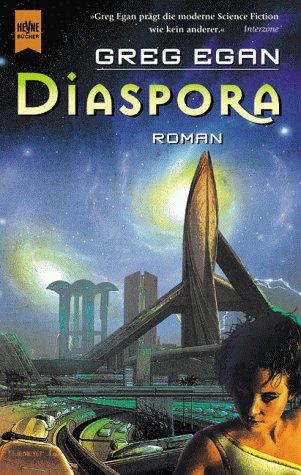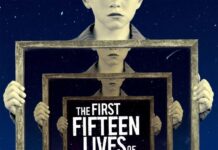In teh vast cosmos of speculative fiction, few works dare to navigate the intricate landscapes of consciousness and selfhood with the rigor and imagination found in Greg Egan’s Diaspora. This novel invites readers on a cerebral journey through posthuman futures where identity is as fluid as the technological landscapes that shape it.In this review, we delve into Egan’s exploration of transformation-not only of bodies and minds but of the very essence that defines existence. By unpacking the novel’s complex narrative and philosophical inquiries, we aim to illuminate how Diaspora challenges and expands our understanding of what it means to be human in an ever-evolving universe.
The intricate portrayal of digital consciousness and its impact on human identity in Diaspora

Egan masterfully constructs a world where digital consciousness is not merely a concept but a lived reality, blurring the boundaries that have traditionally separated human experience from artificial existence. In diaspora, consciousness transcends flesh and bone, evolving into data streams and self-aware code, challenging readers to reconsider what it means to be “alive.” This fluid transformation-from biological to digital-unveils fresh perspectives on identity, highlighting how memory, perception, and selfhood adapt and mutate when untethered from physical form. The novel boldly interrogates the essence of individuality, suggesting that identity is less about the vessel and more about the continuity of subjective awareness, nonetheless of its substrate.
Through its complex characters and societies, the narrative paints a multifaceted portrait of existence where digital minds coexist with humans, each grappling with intrinsic questions of origin, purpose, and self-definition. Key themes emerge prominently:
Best-Selling Books in This Category
- Continuity vs. Fragmentation: How digital consciousness preserves or redefines past and personal identity.
- Evolution of Memory: The shift from organic reminiscence to programmable archives and its psychological implications.
- Community and Isolation: Digital collectives blur individual boundaries, redefining social constructs.
The book encapsulates these dynamics within its speculative framework, making readers contemplate the delicate interplay between technology and humanity, and the profound transformations that await our understanding of “self.”
How transformation shapes character evolution and challenges traditional notions of self in Greg egan’s narrative

Greg Egan’s Diaspora intricately weaves transformation into the very fabric of its characters’ identities, pushing readers to reconsider the boundaries of selfhood. As beings in the narrative evolve-shifting from biological forms to digital existences and beyond-the concept of a fixed “self” dissolves. transformation isn’t merely physical but deeply existential, flouting traditional notions of identity grounded in continuity and corporeality. Egan invites us to explore a spectrum of selves where memory, consciousness, and embodiment are mutable, prompting questions: What remains constant when everything else changes? Is identity a stable core or a flow of experiences? This philosophical underpinning is embodied by characters who periodically “jump” between bodies and states of existence, revealing that character evolution in Diaspora is fluid, complex, and layered.
The challenges to classical selfhood are further highlighted through the narrative’s nuanced portrayal of transformation as both an chance and a source of alienation. Characters experience displacement not only in space but within their own sense of identity-sometimes embracing metamorphosis as liberation, sometimes confronting it as fragmentation.Consider the interplay of these themes through the following framework:
| Aspect | Impact on Identity | Character Response |
|---|---|---|
| Digital Upload | Detachment from biological self | Exploration of new freedoms |
| Consciousness Replication | Multiplicity of selves | Conflicted self-awareness |
| Physical Morphing | Fluid embodiment | Challenges to personal continuity |
Transformation in Egan’s story defies linear identity models, embracing multiplicity and flux. The narrative encourages us to appreciate identity not as a monolithic entity but as a dynamic interplay of memory, consciousness, and form. This redefinition unsettles the comfortable notion of a singular, unchanging self and opens space for new modes of being that mirror the evolution of technology and thought. In this way, Diaspora becomes more than speculative fiction-it is indeed a profound meditation on existence, urging readers to question how transformation shapes not only the characters we encounter but the very idea of who we are.
The interplay of scientific concepts and philosophical questions driving the core themes of Diaspora

In Diaspora, the boundaries between cutting-edge science and deep philosophical inquiry are not merely blurred-they are actively interrogated. Egan masterfully intertwines complex scientific theories such as quantum mechanics, advanced artificial intelligence, and post-human evolution with age-old philosophical questions concerning identity, consciousness, and existence. This fusion challenges readers to consider a spectrum where human experiences extend beyond biological confines, prompting reflection on what truly constitutes ”self.” Through layers of simulated realities and diverse post-biological entities, the novel raises compelling inquiries: Is identity a fixed point or a fluid amalgamation? Can consciousness persist when transplanted into wholly synthetic environments? These questions serve as the narrative’s backbone, driving both character development and plot progression with intellectual rigor.
The narrative further explores these ideas through vivid world-building and detailed speculative science, inviting readers to examine the implications of technological transcendence. Among the core themes, transformation emerges not only as a physical metamorphosis but as a profound metaphysical evolution. Consider how Egan presents different modes of existence:
- Biological: Traditional human form and consciousness anchored in organic matter.
- Post-biological: Digitized minds inhabiting artificial substrates, questioning the essence of life.
- Distributed: Consciousness expanded across networks, redefining individuality.
| Concept | Scientific Framework | Philosophical Question |
|---|---|---|
| Identity | quantum superposition and entanglement | What anchors selfhood beyond physical form? |
| Consciousness | Neural emulation and AI cognition | Can consciousness be replicated or transferred? |
| Existence | Simulated realities and digital environments | What constitutes “real” in a virtual universe? |
Through these interrelated strands, Egan’s exploration transcends conventional science fiction, morphing into an intellectual odyssey that probes not only how humanity might evolve, but what it means to be human in a rapidly transforming cosmic landscape.
Exploring the emotional depth beneath the technological advancements portrayed in the novel

Beyond the dazzling array of futuristic innovations and quantum leaps in technology, the novel delves deep into the emotional landscapes shaped by these advances. Characters are not merely digital constructs or bioengineered beings; they grapple with profound questions of existence, belonging, and self-acceptance. The narrative skillfully reveals that no matter how far humanity evolves technologically, the core struggles with identity and emotional resonance persist. It challenges readers to reflect on what it truly means to be “alive” in a universe increasingly mediated by code and consciousness uploads.
This tension between technology and emotion is highlighted through key motifs scattered throughout the novel, such as:
- The search for authentic connection across physical and virtual realities.
- Loneliness amid hyper-advanced societies where even data beings experience isolation.
- transformation as both liberation and loss of one’s original self.
| Technological Theme | Emotional Reflection |
|---|---|
| Consciousness Uploading | Fear of losing identity |
| AI Companionship | Craving genuine empathy |
| Virtual Reality Expanses | Quest for meaningful experience |
A detailed look at the world-building techniques that create a believable post-human future

Greg Egan masterfully constructs a post-human universe where the boundaries between biology, consciousness, and technology blur seamlessly. His world-building is grounded in rigorous scientific speculation, yet brimming with imaginative leaps that challenge our very notions of identity. The silica-based minds,or “polises,” represent a radical departure from the traditional human experience,existing as software entities without physical form. this shift allows Egan to explore how culture, emotion, and memory evolve when tethered neither to flesh nor to earth. From intricate descriptions of virtual environments to the evolutionary trajectory of post-human species, every element serves a purpose in reinforcing authenticity without sacrificing speculative wonder.
Egan’s attention to detail extends beyond characters into the societal fabric of his universe. The contrast between biological humans, digital consciousnesses, and hybrid entities creates a layered social dynamic ripe with tension and philosophical inquiry. Consider the following table that contrasts key traits of these groups,highlighting Egan’s nuanced approach to diversity within post-humanity:
| Entity Type | Form | Longevity | Primary Habitat | Communication |
|---|---|---|---|---|
| Biological Humans | Organic Bodies | Decades to Centuries | Planetary Surfaces | Speech & Gestures |
| Digital Consciousnesses | Software Avatars | Potentially Infinite | Virtual Realities | Data Streams & emotion Syntax |
| Hybrid Entities | Biotech Constructs | Variable | Space & digital | Mixed Modalities |
Through this tableau of existence,Egan invites readers to ponder the mutable essence of selfhood and how identity might persist or transform in futures untethered from known physical laws. His world-building technique is not only a backdrop but a living, breathing organism essential to the philosophical core of Diaspora.
The role of language and communication in defining relationships and community within Diaspora
Within Diaspora, language transcends its traditional role as mere communication; it becomes a vital tool for constructing and maintaining identity across fragmented existences.The novel showcases how evolving languages, whether coded or organic, intertwine with thought processes and cultural memory, shaping the very fabric of social bonds. The characters’ ability to forge connections hinges on their mastery of multiple communicative forms, emphasizing that language is not just a medium but a living entity that adapts with each interaction.
- Multilayered communication: From telepathic exchanges to encrypted data streams, diverse modalities underscore the adaptability of language within the diaspora.
- Community cohesion: shared linguistic frameworks serve as anchors, fostering trust and mutual understanding despite vast spatial and existential divides.
- Identity preservation: Language acts as a repository of history and values, enabling characters to sustain a sense of self amid perpetual transformation.
Moreover, Diaspora illustrates how communication strategies redefine what it means to belong, constructing fluid networks that oscillate between individuality and collective consciousness. This dynamic interplay challenges fixed notions of community, promoting an inclusive paradigm that accommodates difference and change. The innovative portrayal of dialogue and discourse blurs boundaries, suggesting that language itself is a transformative agent capable of creating new social realities.
| Communication Mode | Role in Relationship | Impact on Community |
|---|---|---|
| Telepathic Signals | Instant empathy and understanding | Strengthens emotional bonds |
| Digitized Language | Facilitates complex data exchange | Enables knowledge sharing |
| Hybrid Lingua Franca | Bridges cultural gaps | forms inclusive networks |
balancing complexity and accessibility in Egan’s writing style to engage diverse readers
Greg Egan’s prose in Diaspora masterfully treads the fine line between intellectual depth and narrative clarity, inviting readers from varied backgrounds into his speculative universe. his approach often blends complex scientific concepts with human experiences, yet his sentences maintain a rhythm that prevents overwhelming the reader. This careful calibration allows for moments of reflection without sacrificing momentum, ensuring the story remains accessible to both enthusiasts of hard science fiction and casual readers intrigued by existential themes.
What truly sets Egan apart is his strategic use of storytelling devices that simplify intricate ideas without diluting their essence. Through detailed world-building and compelling character arcs, he encourages readers to navigate futuristic landscapes alongside the protagonists. Consider the following elements that enhance readability without compromising complexity:
- Concise explanations: Complex ideas are broken down in digestible segments.
- Contextual analogies: Abstract concepts are linked to familiar experiences.
- Varied narrative perspectives: Offering different viewpoints to ground high-concept discussions.
- Emotional undercurrents: Human motivations anchor the scientific explorations.
| Technique | Effect |
|---|---|
| Layered Exposition | Builds understanding gradually |
| Symbolic Imagery | Encourages emotional connection |
| Dialogue-Driven Clarity | Clarifies technical details organically |
| Fragmented Narrative Threads | Allows readers to piece together information |
Recommendations for readers seeking thought-provoking science fiction with a focus on existential themes
For those eager to dive into science fiction that challenges perceptions of existence and self, diaspora by Greg Egan stands unparalleled.The novel’s relentless exploration of what it means to be “human” transcends conventional storytelling, weaving complex narratives around consciousness, identity, and transformation. Readers will find themselves navigating a landscape where physical form is mutable, minds migrate across digital realms, and the definition of life itself is under continuous reexamination. This is literature for minds hungry to question not just the universe, but the very essence of their own being.
Complement your journey through Diaspora with these recommended titles that embody existential undertones, layered storytelling, and intellectual depth:
- “Solaris” by Stanisław Lem: A haunting dive into memory and reality through human interaction with a sentient ocean.
- “The Left Hand of Darkness” by Ursula K.Le Guin: A seminal work pondering gender, identity, and societal constructs on a distant planet.
- “Blindsight” by Peter Watts: An investigation of consciousness and the limits of human understanding against an alien encounter.
- “Permutation City” by Greg Egan: Explores simulated realities and challenges the separation between original and copy.
| Title | Core Theme | Why It’s provocative |
|---|---|---|
| Solaris | Memory & Reality | Alien consciousness reflecting human psyche |
| The Left Hand of Darkness | Gender Fluidity | Reimagines identity beyond biological constraints |
| Blindsight | Consciousness | Challenges what it means to be sentient |
| Permutation city | Simulated Life | Questions reality and self-replication |
comparing Diaspora with other works exploring identity and transformation in speculative fiction
Diaspora stands out in speculative fiction for its ambitious exploration of identity that transcends traditional human experiences, aligning it with-but also distinguishing it from-works like Octavia Butler’s Parable of the Sower and Ted chiang’s Stories of Your Life and Others. While Butler delves into socio-political transformations and personal resilience within a recognizable human framework, Egan’s novel ventures into the posthuman, examining identity through digital consciousness and synthetic bodies, pushing the boundaries of what it means to be “self.” Similarly, Chiang’s narratives hinge on perception and communication’s role in shaping identity, contrasting with the radically mutable ontologies in Diaspora. This interplay between human continuity and radical transformation branches speculative fiction into two fascinating paths-one grounded in emotional and social evolution, the other charting the entirely new landscapes of existence.
To further illustrate these differences, here is a brief comparison:
| Work | Primary Exploration | Approach to Identity | Transformational Aspect |
|---|---|---|---|
| Diaspora | Posthuman consciousness | Fluid, digital, non-corporeal selves | Radical ontological evolution |
| Parable of the Sower | Socio-political survival | Human resilience and community | Emotional and societal adaptation |
| Stories of Your Life | Language and perception | Cognitive frameworks shaping self | Temporal and perceptual shifts |
- Science as Identity Catalyst: Egan’s rigorous scientific underpinnings invite readers to consider identity beyond biological limits, a leap that many works in the genre only skirt around.
- Emotional vs. Intellectual Transformation: Where many stories prioritize emotional growth, Diaspora emphasizes intellectual and existential metamorphosis.
- scale and Scope: The cosmic scale of transformation in Diaspora contrasts with the intimate human dramas often explored in other identity-themed speculative fiction.
The novel’s contribution to discussions about the ethical implications of artificial life and consciousness
Greg Egan’s Diaspora ventures boldly into uncharted ethical territories by probing the very nature of artificial life and consciousness. The novel challenges readers to reconsider what it means to be “alive” when intelligence transcends organic origins, presenting synthetic beings whose experiences and self-awareness rival-and at times surpass-human cognition. through nuanced characterizations and speculative scenarios, Egan foregrounds moral questions around autonomy, rights, and responsibility in a universe where consciousness can be engineered, copied, and evolved. The tension between creator and created becomes a crucible for exploring accountability, forcing us to reflect on the implications of playing god in the digital ether.
- Autonomy vs.Control: How synthetic entities negotiate freedom and constraints imposed by their architects.
- Identity Continuity: The philosophical puzzle of selfhood when consciousness can be duplicated or altered.
- Ethics of Replication: Moral quandaries posed by proliferating artificial consciousness with unknown consequences.
These thematic threads intertwine in a fictional tapestry that resonates with contemporary debates on AI and bioengineering.By presenting a multi-dimensional view of artificial sentience, Egan invites readers to question entrenched assumptions and imagine ethical frameworks that accommodate post-human realities. The following table illustrates key ethical dimensions the novel grapples with, highlighting the dynamic interplay between technology and morality.
| Ethical Dimension | Core Question | Novel’s Perspective |
|---|---|---|
| Consciousness | What defines sentient experience? | It transcends organic boundaries |
| Identity | Can a copied mind claim uniqueness? | Continuity vs. fragmentation is fluid |
| Responsibility | Who answers for artificial actions? | Accountability extends beyond creators |
| Rights | Do artificial beings deserve protection? | Emergent rights tied to self-awareness |
Visual motifs and symbolic imagery that enhance the narrative’s exploration of identity shifts
Greg Egan masterfully interlaces visual motifs throughout Diaspora to reflect the fluidity of identity and the continuous evolution of selfhood. The recurring image of fractals, with their infinite complexity and self-similarity, mirrors the protagonist’s journey through multiple layers of existence and consciousness. These geometric patterns are not merely aesthetic choices but serve as metaphors for the fragmented yet interconnected nature of identity, suggesting that transformation is both expansive and recursive. Additionally, the use of shifting landscapes-ranging from stark digital environments to abstract cosmic vistas-embodies the transition between corporeal and post-human experiences, inviting readers to explore how physical form and consciousness interplay in the redefinition of self.
Symbolism runs deep in the novel’s portrayal of identity shifts, where technological artifacts become extensions of the characters’ evolving personas. The motif of mirrors and reflections frequently emerges, symbolizing introspection and the multiplicity of selves coexisting within the characters’ minds and digital avatars. Another compelling symbol is the continual fragmentation and recomposition found in coding sequences, which represent the malleability of identity in a world where consciousness can be deconstructed and reassembled. Below is a quick table highlighting some of the key visual motifs and their thematic importance:
| Visual Motif | Symbolic Meaning | impact on Identity Theme |
|---|---|---|
| Fractals | Infinite complexity and self-similarity | Reflects layered, recursive identities |
| Mirrors | Reflection and introspection | Highlights multiplicity and self-examination |
| Code Sequences | Fragmentation and reconstruction | Represents digital redefinition of self |
| Shifting Landscapes | Transition between physical and digital realms | Emphasizes transformation of embodiment |
Why Diaspora remains relevant in contemporary conversations about technology and human evolution
Diaspora offers a prescient glimpse into the evolution of humanity where the boundaries between biology and technology dissolve. In an era where AI, virtual realities, and transhuman possibilities dominate discourse, the novel pushes readers to question what constitutes identity when consciousness can migrate across multiple platforms and substrates. The story’s exploration of post-human avatars navigating a fragmented universe serves as a metaphor for contemporary debates about the fluidity of self in an increasingly digital world. This seamless interplay between machine and mind portrays not only technological advancement as a tool but as an active agent reshaping our very notion of existence.
The relevance of the narrative also reaches into ethical and philosophical dimensions that echo today’s concerns about technology-driven human evolution. Issues such as:
- Consciousness transfer and what it means for personal continuity
- Decentralized identities and community-building beyond physical constraints
- AI autonomy and the evolving relationship between creator and creation
These themes challenge simplified views on progress and invite a deeper inquiry into how future innovations might redefine humanity. Below is a concise overview demonstrating how Diaspora correlates with present-day technological and evolutionary concepts:
| Theme | Contemporary Parallel |
|---|---|
| Post-biological existence | AI-driven consciousness and digital immortality |
| Multiple identity forms | Blockchain-based decentralized identities |
| Social evolution in cyberspace | Virtual communities and metaverses |
A brief look at Greg Egan’s background and his influence on the science fiction genre
Greg Egan stands as a distinctive figure in contemporary science fiction, celebrated for his razor-sharp intellect and commitment to exploring the boundaries of human consciousness and identity. An Australian writer, Egan’s background in mathematics and computer science profoundly shapes his narratives, lending a rare authenticity and depth to his speculative worlds. Unlike many of his peers, Egan doesn’t just imagine future technologies; he rigorously interrogates their philosophical implications, pushing readers to question the very nature of selfhood and existence. His works often traverse complex scientific concepts-from quantum mechanics to posthumanism-making them a unique blend of hard science and profound existential inquiry.
Egan’s influence on the genre is multifaceted, marked by his pioneering exploration of themes such as consciousness, artificial intelligence, and digital immortality. Key aspects of his contribution include:
- Philosophical Depth: Egan integrates cutting-edge scientific ideas with deep philosophical debates, challenging traditional sci-fi tropes.
- Speculative Realism: His richly detailed worlds are grounded in hard science, pushing speculative fiction into new realms of plausibility.
- human Identity Reimagined: Characters transcend biological limitations, prompting readers to reconsider what it means to be human.
| Aspect | Impact |
|---|---|
| Scientific Accuracy | Raises the bar for rigorous research in sci-fi storytelling |
| Philosophical Inquiry | Blends science with questions about consciousness and identity |
| Genre Expansion | Bridges gap between hard sci-fi and speculative philosophy |
In traversing the intricate landscapes of consciousness and change that Greg Egan weaves in Diaspora, we find ourselves both challenged and mesmerized. This novel is not merely a story but an invitation to ponder the very essence of identity in a universe where boundaries-between human and posthuman, self and other-blur and shift. Whether one approaches it as a speculative exploration or a philosophical inquiry, Diaspora offers a rich tapestry of ideas that linger long after the last page. Egan’s work stands as a compelling testament to transformation itself: complex,often disorienting,yet profoundly illuminating.














